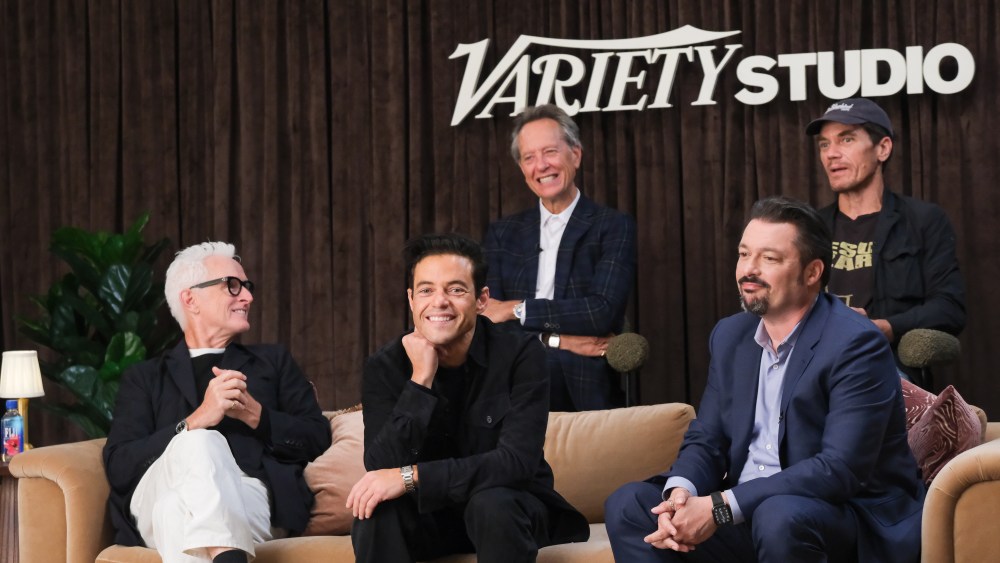James Vanderbilt’s “Nuremberg” may be set nearly 80 years ago, but the filmmakers and cast believe its message resonates as much today as it did in the aftermath of World War II. The courtroom thriller dramatizes the first international tribunal against surviving Nazi leaders, probing not only their crimes but also the nature of evil itself.
The ensemble features Oscar winner Rami Malek as Army psychiatrist Douglas Kelley, tasked with evaluating Nazi war criminals; Russell Crowe as Hermann Göring, Hitler’s second-in-command; John Slattery as a U.S. officer; Richard E. Grant as one of the tribunal judges; and Michael Shannon as Supreme Court Justice Robert H. Jackson, the chief U.S. prosecutor.
Vanderbilt, who both wrote and directed the film, said he first came across the story more than a decade ago and was struck by its immediacy. “It was the fastest I’d said yes to anything,” he recalls. “I thought it was such a fascinating way into a story like this and an exploration of what is the nature of evil.”
Though Russell Crowe and co-star Leo Woodall play pivotal figures who spoke German, neither actor knew the language beforehand. “We cast Leo as a translator, and he didn’t speak German,” Vanderbilt shares. “But both of them worked incredibly hard to be able to pull that off. Russell dove into the research and wanted to bring that charisma Göring historically had. It was about creating someone who could seduce you even as you’re repulsed by what he stood for.”
Malek praised his colleagues’ commitment, recalling how intense those claustrophobic cell scenes became: “When you go toe to toe with Russell in that environment, you leave nothing on the table. There were moments where we were inches away from each other, yelling, destroying one another, and yet still finding something human. It was magnificent to play off him.”
Slattery sees the relevance of telling the story now, especially as the world contends with new threats to democracy. “It’s relevant certainly now, but it isn’t a history lesson,” he says. “It’s a thriller. The first international tribunal ever organized, the first time film footage was used as evidence to show the world what this regime perpetrated. And the challenge was to put your personal feelings aside and try these men impartially, to allow the world to see what they had done.”
Oscar nominee Grant (“Can You Ever Forgive Me?”) pointed to the authenticity of the production. “Jamie Vanderbilt’s extraordinary script and the recreation of the sets down to the last millimeter were remarkable,” he says. “Many of the Hungarian extras had firsthand family experience with Nazi or communist occupation, so when they watched a character found guilty and made accountable, you felt it in the room. It was electrifying.”
Shannon, who brings his trademark intensity to Robert Jackson, said acting gave him a chance to study history in ways he never did in school. “I was a really lousy student,” he says with his signature dry humor. “But one of the perks of acting is that you actually learn so much more about history and the world than you did sitting in some stupid classroom. To get inside this history and live it is a tremendous gift.”
He also pointed to the film’s deeper message: “Jackson understood that in order to deal with evil, you have to investigate it. You have to dissect why it exists and why it manifests through people. That’s a critically important skill for human beings to have.”
Still, Shannon couldn’t resist some levity when asked about future collaborations with frequent partner Jeff Nichols, whose films such as “Take Shelter” and “The Bikeriders” have defined his career. “Jeff has a hard time getting money to make a film,” he jokes, but with a hint of sincerity. “He’s made six magnificent movies and still can’t get the funding he deserves. So I guess if you’d like to see another Jeff Nichols-Michael Shannon movie, please visit our GoFundMe page.”
For Malek, who won an Oscar for “Bohemian Rhapsody,” “Nuremberg” felt like another opportunity to dig into a defining chapter of history. “This is one of those stories that, if we got it right, we could all look back and say, not only did we make a film, but we told a story that had to be told in a way that was nuanced and surprising,” he said.
Vanderbilt hopes audiences see it as more than a history lesson. “We built it as a thriller,” he explained. “It’s about exploring evil, but it’s also emotional, riveting and entertaining. Like the historical thrillers I grew up with — ‘JFK,’ ‘Apollo 13,’ ‘Glory’ — it’s about something serious, but it should also move you. Once the film is out in the world, it belongs to the audience.”

